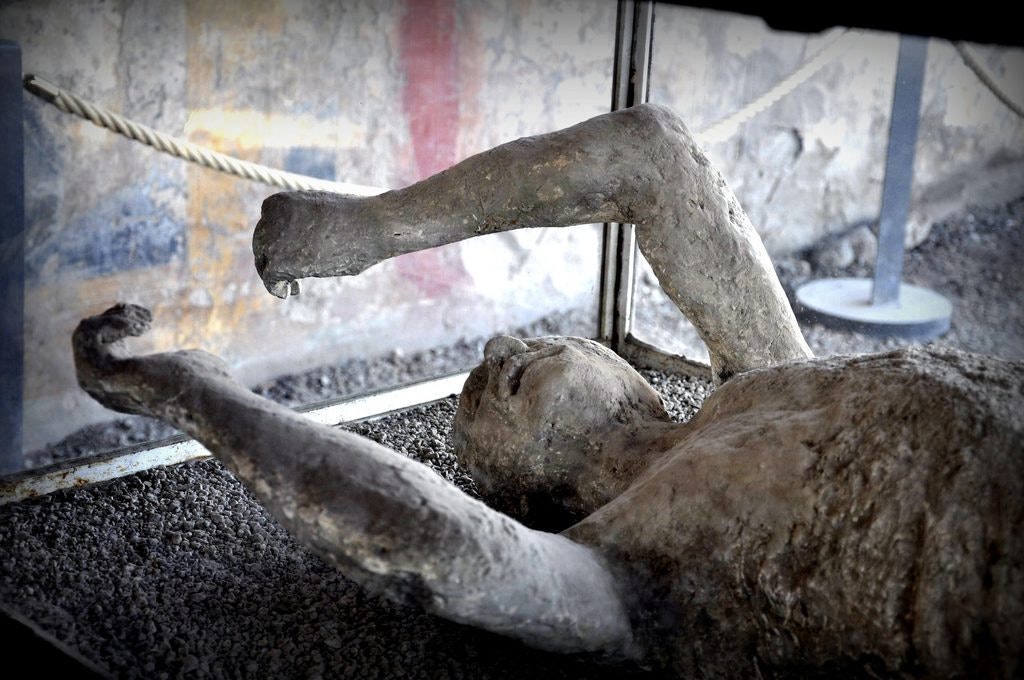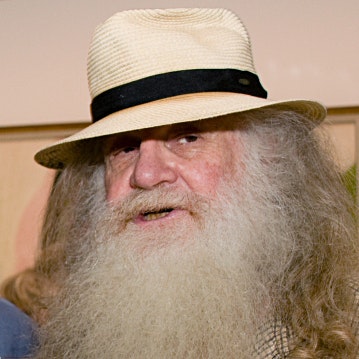Hold on, that figures
John von Sturmer

Body of Pompeii. © Carlo Mirente 2011.
I
[Time]
Time permits only when and what it permits. And who is to make the choice between issues of urgency and what one might reasonably be expected to produce at one’s leisure? Writing, any form of production—what or whom is it for? Why invoke the spectre of time and timing, even at this early phase?
To be wholly honest, I never quite know what time is—or space. I’m happy with notions like the moment or duration or place. These others are too fanciful, even oppressive. Too not there.
There is no category of thought that cannot be challenged; and that should not be challenged, especially in conditions of change (one might say at particular epochs), and at the moment of the shuddering encounter (time ruptured). At least it should be suspect.
It is the specificity of events, encounters, ‘findings’ that enables (provokes) the challenge, a certain sort of attentiveness. Time and space, in drawing attention to themselves, delete all specific content and possibility. The event can only come as a surprise, the piece of string on the footpath, fragments of an overheard conversation: ‘I’d say there is more going on in the suburbs’. As the remark is itself being made—as the act of overhearing takes place—the suburb may well have disappeared. It too is in its moment.
II
[Distance]
An old personal witticism, if we can call it that: ‘The last symphony orchestra will be playing in Seoul, Korea’. Or, seven thousand synchronised pianists playing Gershwin (1). When Asia—East Asia—becomes the very embodiment of the West, its true custodian, its ‘multiplication’, Europe itself will be left with trifles of itself: The Last Days of Pompeii (2), but in this case the last—or next to last—days of Caravaggio (3). His impact, what is that? The impact of anybody or anything. We’ll leave out the ‘master’ and go for the acolytes, if that is what they are. Wiesbaden this week, the heirs without the graces; the Judgment of Paris might have fitted in somewhere.
You can check this out for yourself. Long distance disappears, but that disappearance does not mark a moment of globalisation. We are no closer, we are just imposed upon in a very particular sort of way. ‘You will treat with this, this is what you will treat with.’ The residues. We may demand this: a more serious effort to deal with the residual in art, in which history becomes a movement away from.
The test, if there is one, is to assess, if we can, the degree or extent of imagination. Not fancy but what’s available (mostly), while we await the first of the great modern disasters. A plane goes down but, lo, Mona is safe in her fire-proof box while some idiot jumps to the conclusion that it was Mona herself who did it, her presence in that ‘black box’ of overwrought relevance. Marking distance, marking time. Proximity and distance may end up inseparable.
The idiot may be right: the presence of that work, an inducement to disaster, an invitation to an assault (4). Meanwhile, a Grander Hand sits in wait, gleeful almost, understanding the relief to be achieved by the disappearance of the ‘commanding’; what we might call the imperious, with its capacity to draw the mob but at the same time to cast them off like abandoned bluebottles. Suckers! But after all they did see it. Like any tourist site where the same photos are taken over and over as if, without them, the scene will disappear—but they disappear anyway into the obliteration of the image, the obliteration that is built into the image itself—which must be substituted in order to survive at all. No doubt all of us have attempted at one time or another to provide our own re-rendering. It is not verboten.
Maybe it was a smart move to have a show devoted to Caravaggio in which Caravaggio himself (shall we say his hand?) does not appear. And we might then wonder about other things: why Artemisia (Gentileschi) understood perfectly well the hazards of taking the enemy into one’s own camp. Vlad the Impaler was a guest, after all, of the Ottoman Sultan, a required guest under conditions of enforcement. And the Sultan’s ‘reward?’ A forest that isn’t; a bitter reward in which the expectation (of Vlad as perpetrator) is that like will ward off like: a tableau announcing your own fate. (‘That forest is not trees my son. Go rot in hell’.)
Others say, ‘Keep your enemy close at hand …’ Another consideration of distance.
Closer to home, Wallacia in Sydney is no relation to Vlad’s Wallachia. It’s just an act of carelessness—Wallace poshified, Latin-ated. A newly impaled history! Or is there a suggestion, after all, that you should stay away? Anything can serve as invitation—and exclusion.
III
[Information]
Links that count, links that don’t. How are we to tell? We might essay this thought: that for a connexion to appear at all it must somehow pre-exist. There is no nexus as it were out of nowhere. We shall refrain from referring to this linkage as fate, though there are those who may endorse such a usage or ‘move’. Such a usage is like putting a key in the lock—and closing the door—while making the door itself endlessly attractive. To lock it does not heighten the prestige or render things more beguiling. It may suggest that whatever ‘arrangement’ is set in place or identified (no matter how partially, for there is no complete or absolute nexus) is somehow sacred and not to be sullied. There can be no guarantee that the hostile or the antagonistic should be less sacred than the good or the valued or the untouchable.
What we can say is that the altar of the sacred requires endless ‘gifts’ or offerings. This is not to speak of renewal, though it is a line of thought that might tempt us. Reasonably we might ask, ‘If renewal is necessary, why?’ We might think of death as providing the very conditions of renewal—as providing a questioning of continuity: ‘Why must it be—or is it merely?’ Is it this that casts us into the shade, the playground of life? A lucky dip in which every appearance, even those most pleasant to behold or experience, promises a terrible and inexorable defeat? Life defeats us, not death. So it is not death itself that must be compensated through art, but life in its very lack.
IV
[Art]
There is no need to linger before the art work anymore than we must linger before the spectre of life. This is not to say that we must attend to life and its presence via a sidelong glance, as if in avoidance, or tremulous, or afraid. It is an absurdity to think that life should be the object or the occasion of fear. In art there is nothing less frightening than the skull or the skeletal; they hover—especially the skull—on the edge of the comic. That is what is so problematic about vanity, vanitas: its false cheeriness, its absurdity, not necessarily in that order.
There is no real need to treat the bones of the dead with respect. They might be our cheerful companions. There is respect in that cheerfulness. Grief is merely that powerlessness we feel in the presence of the dead.
Art? Can we truly think of it as the bones of the dead—the veins, the sinews, the musculature, the skein of nerves, the nooks and crannies that might draw our sight or our roaming fingers? Can we explore death?
V
[Prototypes: here and there]
OK. My name is Smith Brown Jones of Albuquerque, except I have never been there and have no conscious intention ever to go there. It exists in some sort of form. In my own case it has sprung out of nowhere. What I may do is Google it up. I’m bound to be surprised, for without knowing it I exist in a world of expectations; the ‘match’ between expectation and what is actually there. Well, what are we saying if we have no expectation? If there is no expectation there can be no match or even mismatch. But how can we talk about no match when there is nothing to match it to?
When it finally appears it does occasion surprise for there is a sort of prototype: Alice Springs. What surprises me is that it is more as it might be than we anticipated. Of course if it looks like Alice Springs; even in any sort of way that is not really surprising. We might be cheeky and assert that what we call Albuquerque was always going to resemble something. That is what we do, our work, our task noble or ignoble—to create some sort of similarity or ‘likeness’. (To make it not like we first have to say ‘not like’, which means putting it in a field of comparison.) I’m pretty sure it has a suburb called Smug. (I’m equally certain there is not.) I know that nearby there is a place of some sort of other called Truth or Consequences. Anywhere could be anywhere. It is and it isn’t. Its official currency is the Rupiah. (Well, it will be tomorrow as soon as I have announced it.) When they vote for President who will they vote for? Will it count, or will the result be forgotten even before it is ‘official’? Will my fellow Albuquerqueans (I allow myself a choice of demonyms: Alburquerquers, Albuconkers, Bugs, Fly-by-Nights, Squid, Saratogas) appoint their own president? Might as well, they say. They might turn to their sister city Lanzhou for guidance. There are the Rednecks and Touristic Rubber Necks and Other Necks. Their sister city operates in a totally different food zone (5). From an olfactory point of view they are incompatible. If the Yellow River is yellow, the Rio Grande is not so grand and is more Rojo than Great. Bugs gets lost once again: ‘Turn left young man.’ (6) But surely one likes to think of Bugs as a good old-fashioned libertarian rather than as a hand-on-heart leftie.
VI
[Politics]
Politics. We have left this topic to last. From where I sit the scene is dominated by what I shall call the issues brigade and the ‘tragedy-of-my-life’ brigade. Except the ‘causers’ seek a majoritarian position while at the same time claiming to be the single-minded and solitary geniuses of protest. (We might say that as soon as anything has become a cause it already bears the stamp of the official; it is already itself fatally conjoined at the hip with ‘the lost cause’.) There is also the ‘me-and-my-mental-illness’ brigade (more often poets than painters), who might rally round the ranks of the self-improved. The new wowsers who are yet to understand—they never will—that they are not alone and that their ‘condition’ does not confer some special privilege. Secretly all suffer. Fortunately, it is only a small proportion of these who insist on making the other suffer in the name of their suffering. There is integrity in withholding. The loud-hailer self is not a pretty sight, and a worse sound—its art as vacuous as any dry gulch.
There is no real art in the confessional.
Discretion in art. Let us consider that. The best art should not stir us, it should leave us alone. If you want the Marseillaise, lock yourself in a dark room (preferably soundproofed) and play it over and over again. Sirens and loud wailing optional. Mugir les féroces soldats.
In the street Dad utters: ‘Hey kids, let’s go eat. I’m so hungry.’ Now there’s a field of action announced. Dad doesn’t say, ‘Let us starve, let us suffer, deprivation is our proper lot.’
About the contributor
John von Sturmer is a social anthropologist with a long and distinguished career in Aboriginal studies.
